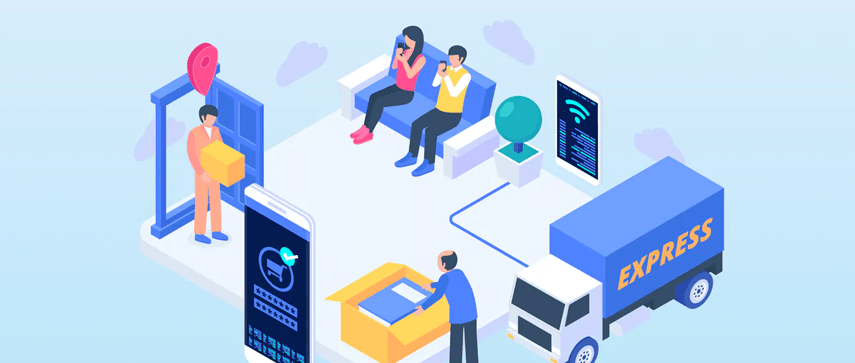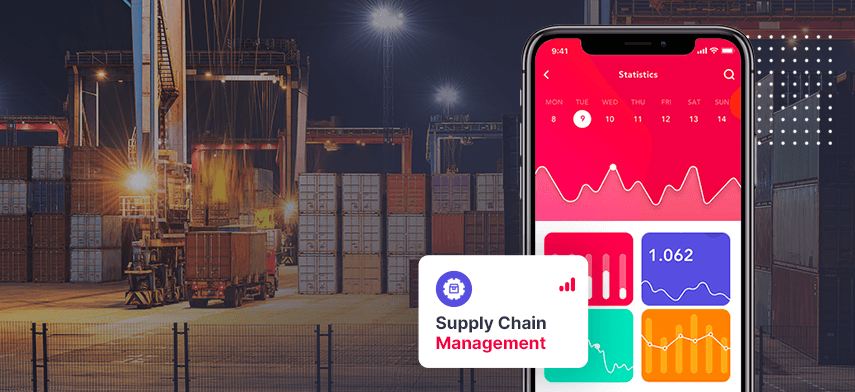COVID-19 is the main reason for the disruption in supply chain management companies across the world. It is one of the vital lifelines in supporting the responses like keeping up the crucial medical supplies, food, and other essentials that flow where they are required most.
The pandemic is proving to be the real test for corporate purpose and values. Investors, consumers, communities, and governments will determine an organization based on their response to the period of disruption. The supply chain management solution for businesses will focus mainly on getting the proper supply chain.
The Rise of Mobile Phones in Supply Chain Management
New technological advancements keep transforming the process of daily businesses. Many in the supply chain management need real-time mobile asset tracking systems and accurate delivery systems that make supply chain management ripe for technological innovation including wireless, mobile, handheld technology that is leading the way throughout the transportation and logistics sectors.
In telecommunication, the appeal of the smartphone supply chain allows operators to offer new services to their customers. Three examples that spring to minds are:
- A remarkable development in Africa through mobile banking.
- The mapping application which is bought by Google for $1.15 billion in 2013 and quickly rendered obsolete automotive GPS.
- Content streaming is now keeping the distribution of video/audio content.
With the ever-changing flexibility of technology, keeping up with the best practices and new capabilities is a challenging task for large-scale supply chain management companies and organizations that have invested profoundly in older technologies. The major smartphone manufacturers can compete fiercely on the low quality of their level and design specifications to attract customers and maintain loyalty. However, the focus is on the supply chain's infrastructure as an alternative to maintaining profitability.
The influence of the smartphone supply chain has been tremendous, and the penetration rate is decreasing to single-digit growth for the first time globally. The device's lifespan is usually less than three years, and the market share in defending or winning the stakes is enormous. Smartphone manufacturers are constantly fighting to reach the top spot. The two co-leaders of the smartphone market, Samsung and Apple are facing the arrival of new Chinese manufacturers (ZTE, Meizu, Huawei) and the fierceness from historical manufacturers like LG and Sony.
The Latest Trends in Supply Chain Management and Impact of Mobile Technology
The inventory and supply chain management trends keep changing, and with 2020 they included the greening of the supply chain. The growth of globalization, machine learning, and artificial intelligence (AI) have made a deeper impact on mid and small-sized businesses.
These businesses have been affected disproportionately by the pandemic. The global economy hit hard in 2020, without a definitive stop to this pandemic. Resiliency is what supply chain management solutions are integrating into their operations. Keeping this in mind, here are few trends for 2021 which could help your business post-COVID -19:
Diversification of supplier
It is the key component for the resilience concerning the supply chain. The United States has created a powerful international trade network along with suppliers from international borders. Domestic and international suppliers retain the advantage for products and packaging goods, which is low cost and results in high-profit margins for sellers and distributors.
Automation
Automation appears in numerous forms and is used sequentially in technology which helps in managing the workflow and improving the process. People generally think about robots when we talk about self-driven trucks or automated warehouses, including automation of the supply chains. Automation is usually penetrating various other areas of the supply chain and software. Many supply chains, even SMBs, are now digitizing their operational process.
Focussing on eCommerce
eCommerce gained visibility in 2020 as the pandemic accelerated its growth in just a few weeks, although the rate is expected to decrease in 2021. eCommerce remains one of the valuable sales platforms that is expected to keep growing. eCommerce is a website for shoppers, and it includes reliable and speedy order fulfillment. Customers are additionally using free and faster shipping methods with eCommerce.
Cloud-based technologies
Extending the supply chains across borders and managing the software and cloud computing simultaneously is one of the on-demand systems of computer resources like servers, data storage, and computer powers delivered around the internet. The cloud-based service assists in lowering down the operating costs and scales up your business efficiently.
Smartphones like iPhones, Blackberry, Samsung, and tablets are competent and capable of running on operating system software. They are essential in providing a good platform for the application. The computer software is designed to help the users in performing multiple or singular tasks. Few known applications are based on location, and others use transportation information and maps.
The functions aid in controlling, messaging, tracking, and timekeeping. It is beneficial for operational execution and supply chain management (SCM). It has excellent potential to enhance productivity and improve customer responsiveness while reducing employee downtime.
Smartphone applications are endless, right from traceability and basic visibility through the warehouse management and order solutions to the transportation management systems. As smartphones have a camera, they serve as a user-friendly version of the barcode scanner. For their easy-to-use interface, smartphones appear to be the best option for operational Supply Chain Management activities.

Mobile Apps Ensuring Transformation in Supply Chain Management

Express deliveries are one of the examples of supply chain management apps. When the driver reaches the location of the customer, he can dial the logistic telephone serve and type his branch number and delivery round into his smartphone. When the delivery is completed, the driver can use the device to record the status of the delivery. The system assists the driver in confirming the entry and time of delivery to process it. You can obtain all essential details promptly as it is available on the respective platform through the logistic company's app interface. All the other partners in the supply chains can find it easy to access the data. Smartphone supply chains can also prove to be an ideal solution for various freight areas where subcontractors are likely to change frequently and forward it to the industries respectively.
Smartphones can easily read barcodes, therefore reducing additional expenditure. Apart from this, smartphones also consist of built-in audio headsets and GPS that ensure warehouses pick rates efficiently. The navigation can be instantly done through the warehouse with the help of voice instructions features.
As smartphones are easier to use, it is one of the best solutions for operational SCM activities. The scope of their use in operational supply chain environments remains to be limited so far. Like for example, they are not perfectly equipped and could function better. Besides, they cannot be integrated with all the systems like the truck's navigation system, which is a growing security concern. The manipulation of data on smartphones is due to the increase in the amount of business-critical data readily available.
Logistics and shipping are typical businesses having several factors to deal with for every order. Managing transportation and inbound logistics management business is quite complicated, so it is safer to utilize the mobile app and carry out different logistics.
Mobile applications help the clients track their orders easily with the help of integrated GPS technology. Through a few clicks, you can get real-time updates on the shipments and make the changes simultaneously to the orders in progress, hence, empowering and improving the supply chain management. It provides great power into clients' hands and makes the logistic and shipping companies accountable.
Here are the top 5 key advantages of having a mobile app in supply chain management:
1 The sophistication of processes
Transportation and supply chain management companies can connect themselves with the partners involved in the manufacturing process. The consignments are transported from the manufacturing unit to the delivery points. The whole process needs to be completed to ensure speedy performance, delivery timelines, and smooth operations.
2 Real-time inventory status
Timely deliveries are one of the essential aspects of the business to track your fleets easily with the logistics app. The mobile apps help the clients and companies as they provide real-time information for the good inventory and help them save time, workforce, and money.
3 Paper-based automation
The logistic applications can help in eliminating the need for any paperwork. Most organizations use mobile apps, which are helpful in the collection of data. It can be useful to measure the relevant metrics like driving time, mileage, etc.
4 Warehouse management is easier
Mobile apps in logistics are expected to double by 2020. The startup segment can contribute up to 50% of the demand for developing the logistic mobile app.
5 Customer service solution
Mobile applications help enhance the customer service experience and increasing customer satisfaction. Customized logistic mobile application for customer servicing helps track the shipments, booking for transportations, checking inventories, and reporting complaints.
Conclusion
Businesses and organizations have to be sure about whether they are well equipped to deal with forthcoming changes and transformations. This includes the flexibility of the supply chain and the power to scale up at the logistical level whenever necessitated. There are no guarantees for the next year, which is why it is essential to make your supply chain operations one of the assets instead of liabilities. The most significant supply chain of 2021 and inventory management trends are focused on building up a resilient supply chain that will allow the companies to adapt to the disruptions and sudden changes promptly.





 March 11, 2021
March 11, 2021


